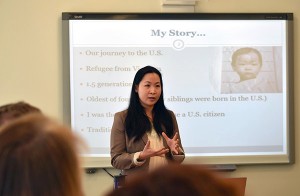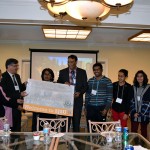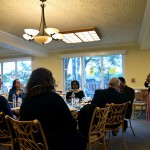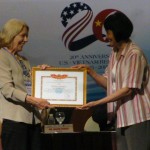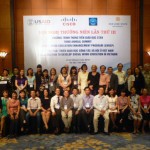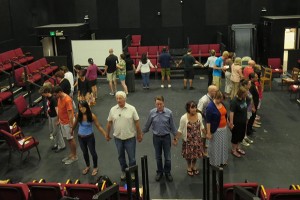
Photo courtesy of Matthew Spangler
Dr. Matthew Spangler, center right in gray, and Dr. David Kahn, center left in white, lead participants of a 2014 summer institute, “The Immigrant Experience in California through Literature and Theatre” through a performance exercise. The pair will host the program this summer with a National Endowment for the Humanities grant.
Matthew Spangler, a professor of communication studies in the College of Social Sciences, and David Kahn, a professor and chair of the Department of TV, Radio, Film and Theatre in the College of Humanities and the Arts, will be leading a summer institute for K-12 teachers and graduate students at San Jose State in July, with a grant from the National Endowment for the Humanities (NEH).
“The Immigrant Experience in California through Literature and Theatre” will bring 25 teachers and graduate students working toward a career in K-12 teaching to SJSU where they will interact with professors from a multitude of disciplines as well as artists and authors who have explored the immigrant experience in their works. The teachers will explore the written pieces through performance activities and will perform a piece of their own creation by the end of the program.
“The institute combines immigration and performance, and that’s what I do with my scholarship,” said Spangler, who wrote Staging Intercultural Ireland: New Plays and Practitioner Perspectives (co-edited with Charlotte McIvor, Cork University Press, 2014).
“The Immigrant Experience in California through Literature and Theatre” was offered at SJSU in 2014 through an NEH grant, with 150 teachers applying for the available slots. Guest faculty include Maxine Hong Kingston (author of The Woman Warrior) and Andrew Lam (author of Perfume Dreams: Reflections on the Vietnamese Diaspora), playwright and SJSU alumnus Luis Valdez, ’64 English (author of Zoot Suit and founder of El Teatro Campesino), and theatre artist Ping Chong (author of East West Quartet and creator of “Undesirable Elements” performance series). The program will discuss immigration in an historical context with curriculum around emigration from Mexico, China, Afghanistan and Vietnam to California.
Other SJSU faculty members who are involved in the summer institute include Glen Gendzel, an associate professor of history, and Persis Karim, an associate professor of English.
Spangler, who studied at Trinity College in Dublin and completed a dissertation on Irish author James Joyce, said he became interested in the influence of immigration on Irish arts when there was an influx of movement into the country between 1995 to 2008.
“Ireland has a long history of emigration and it doesn’t have a national mythology around immigration like we do in America,” Spangler said. “Immigration is turning that on its head and demanding Ireland rethink its national identity.”
In addition to his scholarship, Spangler has also adapted books for the stage, including Khaled Hosseini’s Kite Runner and T.C. Boyle’s Tortilla Curtain.
“The book has to be something I really like,” Spangler said, of working on an adaptation. “When you write a play, you spend a lot of time with it. It takes about a year to write it, then I look for a theatre that wants to produce it and then there’s the rehearsal time. It can be a two-to-three-year process so it has to be a story I really feel connected to and I want to share.”
Read more about “The Immigrant Experience in California through Literature and Theatre” online.
